|
|
|
Sort Order |
|
|
|
Items / Page
|
|
|
|
|
|
|
| Srl | Item |
| 1 |
ID:
153286
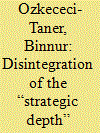

|
|
|
|
|
| Summary/Abstract |
By way of tracing a number of important developments in the last decade, this paper examines Turkey’s foreign policy under the leadership of the Justice and Development Party, with specific emphasis on the “strategic depth” doctrine. More specifically, after providing a very brief overview of Turkey’s foreign policy orientation between 1923 and 2002, the paper first discusses the basic principles of the “strategic depth” doctrine and then analyzes how three main issues – Islamization of Turkish foreign policy, the Arab Spring, and the increasing discrepancy between Turkey’s domestic politics and the image Turkey’s leaders wanted to present to the outside world – led to the disintegration of this doctrine.
|
|
|
|
|
|
|
|
|
|
|
|
|
|
|
|
| 2 |
ID:
066782
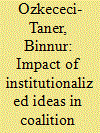

|
|
|
| 3 |
ID:
120746
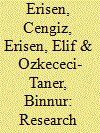

|
|
|
|
|
| Publication |
2013.
|
| Summary/Abstract |
Given the interdisciplinary nature of political psychology research, the methods employed to produce scientific knowledge should be able to answer the questions raised in the discipline. The multitude of methods used in political psychology offers a variety of options for those interested in conducting research in political science. This article explains the basic structure of experimental design, survey research, and content analysis and briefly discusses the recent developments and interest growing on certain methods in the discipline. Each method is discussed in detail to the extent that would be sufficient to understand what one could achieve by using it.
|
|
|
|
|
|
|
|
|
|
|
|
|
|
|
|
| 4 |
ID:
095494
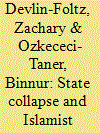

|
|
|
|
|
| Publication |
2010.
|
| Summary/Abstract |
When states collapse, so do the most obvious obstacles to violent extremism in their territory. Extremists seem free to recruit and operate from these areas without interference from state security forces. In reality, however, state collapse creates as many constraints as opportunities for extremists. This paper problematizes the commonly held view that there is a strong link between state collapse and the rise of extremism, in particular Al Qaeda-linked extremism, that creates security threats worldwide. By comparing the Union of Islamic Courts (UIC) in Somalia and Al Qaeda in Iraq in Iraq, the paper discusses the implications of state collapse for Islamist extremism. Our empirical analysis suggests that although there is a correlation between state collapse and an increase in Islamists' appeal and influence, state collapse does not necessarily generate more violent ideologies. Rather, state collapse allows those committed to violence under all circumstances to ally more moderate elements. If the population comes to see the Islamists as destabilizing rather than securing, they may turn on them, leading the moderate Islamists to either break with the extremists, or follow them to the political margins. Similarly, extremists may grow weary of moderate actions, demanding that the group increase its violence and, again, forcing moderates to choose between the extremists' vision and broad political support. Therefore, our main finding is that contrary to the commonly held view, the population of a collapsed state, rather than an extremists' hotbed, can, in fact, be a potentially powerful anti-extremist force.
|
|
|
|
|
|
|
|
|
|
|
|
|
|
|
|
| 5 |
ID:
178597
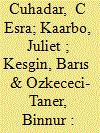

|
|
|
|
|
| Summary/Abstract |
Using both quantitative and qualitative research techniques, we investigate the effect of leaders’ style and personality on foreign policy. The study examines six Turkish leaders, Süleyman Demirel, Bülent Ecevit, Necmettin Erbakan, Recep Tayyip Erdoğan, Abdullah Gül, and Turgut Özal, and 18 foreign policy cases to answer the following questions: do Turkish leaders differ from each other in terms of their personality traits and styles?; how did their styles affect their foreign policy choices?; and how did they react to various domestic and international constraints they encountered in cases of foreign policy? Our findings suggest that: (a) in terms of their personality traits, Turkish leaders do not collectively fit in one category; (b) there are some stark differences among our six leaders, although some leaders are more similar to each other than others in terms of their personality traits and styles; (c) these differences were observable in the foreign policy decisions they made.
|
|
|
|
|
|
|
|
|
|
|
|
|
|
|
|
|
|
|
|
|